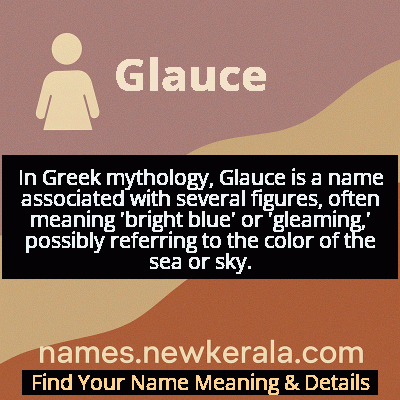Glauce Name Meaning & Details
Origin, Popularity, Numerology Analysis & Name Meaning of Glauce
Discover the origin, meaning, and cultural significance of the name GLAUCE. Delve into its historical roots and explore the lasting impact it has had on communities and traditions.
Name
Glauce
Gender
Female
Origin
Greek
Lucky Number
4
Meaning of the Name - Glauce
In Greek mythology, Glauce is a name associated with several figures, often meaning 'bright blue' or 'gleaming,' possibly referring to the color of the sea or sky.
Glauce - Complete Numerology Analysis
Your Numerology Number
Based on Pythagorean Numerology System
Ruling Planet
Uranus (Rahu)
Positive Nature
Strong sense of order, loyal, practical, and disciplined.
Negative Traits
Stubborn, overly serious, rigid, and prone to feeling restricted.
Lucky Colours
Blue, gray.
Lucky Days
Saturday.
Lucky Stones
Blue sapphire.
Harmony Numbers
1, 7, 8.
Best Suited Professions
Managers, engineers, accountants, organizers.
What People Like About You
Dependability, discipline, practicality.
Famous People Named Glauce
Glauce of Corinth
Mythological Princess
Central figure in Medea's revenge, died from poisoned wedding dress
Glauce (Nereid)
Sea Nymph
Divine sea spirit representing the ocean's color and shimmer
Glauce (Amazon)
Warrior
Fought Heracles in Amazonomachy, representing female strength
Name Variations & International Equivalents
Click on blue names to explore their detailed meanings. Gray names with will be available soon.
Cultural & Historical Significance
Extended Personality Analysis
The name Glaque suggests a personality marked by ethereal grace and deep emotional currents, much like the sea from which it derives meaning. Those bearing this name often exhibit a calm, almost otherworldly presence that masks intense inner depth and sensitivity. They tend to be highly intuitive and empathetic, capable of reading emotional undercurrents that others miss, reflecting the Nereid's connection to the mysterious depths. However, like the tragic princess, they may possess a certain innocence or idealism that makes them vulnerable to life's harsh realities. This combination creates individuals who are both dreamy and perceptive, artistic yet practical when necessary. Their emotional intelligence is typically high, allowing them to navigate complex social situations with grace, though they may retreat when overwhelmed by the world's intensity. The name suggests someone who moves through life with poetic sensibility, finding beauty in ordinary moments while maintaining a certain detachment that protects their rich inner world. They often excel in creative fields where their sensitivity and imagination can flourish, and they make loyal, deeply feeling friends who remember kindnesses and slights with equal intensity.
Modern Usage & Popularity
In contemporary naming practices, Glauce remains an exceptionally rare and scholarly choice, primarily favored by classicists, mythology enthusiasts, and parents seeking names with profound historical resonance. Its usage is most concentrated in Greece and among Greek diaspora communities, though occasional appearances occur in Italy, Brazil, and other countries with strong classical education traditions. The name has never appeared on popular baby name charts in any country, maintaining its status as an exclusive choice for those valuing uniqueness and cultural depth. Recent decades have seen a modest increase in mythological name popularity, potentially leading to more frequent use, though it remains far from mainstream. Modern bearers often appreciate the name's connection to classical literature and its distinctive phonetic quality, though many choose simplified pronunciations or nicknames for daily use. The name's rarity makes it a statement choice that signals intellectual curiosity and appreciation for cultural heritage, often selected by parents with academic backgrounds or particular interest in classical studies. Its continued use, however limited, demonstrates the enduring power of Greek mythology to inspire naming choices centuries after these stories were first told.
Symbolic & Spiritual Meanings
Glauce carries profound symbolic weight derived from its dual mythological heritage and etymological roots. The name's primary meaning of 'shining sea' or 'bluish green' symbolizes the ocean's eternal duality - its surface calm masking powerful undercurrents, much like human emotions that appear tranquil but run deep and strong. As the tragic princess, Glauce represents innocence destroyed by passions beyond her control, symbolizing how purity and beauty can become casualties in conflicts driven by jealousy and ambition. Her story serves as a cautionary symbol about the destructive potential of betrayed love and the vulnerability of those caught in others' emotional crossfires. Simultaneously, the Nereid Glauce symbolizes the sea's mystical qualities - intuition, depth, and the connection between human consciousness and natural forces. The name embodies the intersection of human drama and elemental power, representing transformation through suffering and the enduring nature of mythological archetypes. It suggests someone who bridges different realms - the practical and the mystical, the emotional and the intellectual - making it symbolic of integration and the search for meaning in both human relationships and the natural world.

